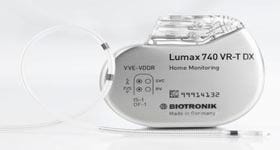FDA Approves Novel ICD Device Made by Biotronik. But will the Company Win Share in the U.S.?
Biotronik, the German medical device company, has won approval for a novel ICD. But will it win the hearts and minds of doctors?
Biotronik, the German medical device company, announced the U.S. approval of a new ICD on Monday, that it described as a “game-changer.”
0 0 1 599 3419 UBM Canon 28 8 4010 14.0 Normal 0 false false false EN-US JA X-NONE
It is the first single-lead ICD capable of performing both pacing and atrial sensing to win the regulatory nod from the Food and Drug Administration.
The question is how much traction Biotronik will be able to gain in the U.S. ICD marketplace given the dominance of Medtronic and other players like Boston Scientific and St. Jude Medical.
The Lumax DX System |
|
|
ICDs are implantable cardioverter defibrillators that are capable of shocking a person back to life when a person suffers heart failure.
In an email interview, Rex Richmond, Biotronik’s vice president of marketing and communications, says that the Lumax DX System provides the benefits of the single and dual-chamber in a single-lead device.
“About 40 percent of patients, who receive an ICD, receive a single chamber device, which are designed to only to sense changes in ventricular rhythm and are unable to sense atrial arrhythmias, such as AF, correctly,” Richmond says. “This can result in an increased risk of an inappropriate shock or potentially a stroke.”
But there are other benefits beyond simply the clinical. For instance, because there is only one lead to implant in the heart region, the procedure is less complex and less costly. Further, there are fewer lead complications, Richmond said because of fewer leads in the heart. For all the above reasons, the product may be attractive to electrophysiologists who typically implant dual-chamber ICDs.
But in the last 12 months, another ICD has been touted as revolutionary as well. And that is Boston Scientific’s S-ICD, developed by Cameron Health which it acquired in 2012. The S-ICD system has also been approved and that has no leads in the heart – period. The subcutaneous ICD has placed just beneath the skin.
Previously, Ken Stein, the chief medical officer of Boston Scientific’s cardiac rhythm management division has said that leads are the weak links in the ICD system, and by eliminating the need for those the S-ICD makes having an ICD safer for patients.
But Richmond of Biotronik believes that the jury is still out on the S-ICD device. The implant is large and the procedure complicated to perform. Not to mention that the device does not allow pacing and home monitoring.
Senior Analyst Glenn Novarro of RBC Capital Markets however believes that even though the implant is large and the procedure complicated, doctors are confident that they will be able to perform the procedure easily with each additional procedure. As with any new technology, the learning curve is steep initially.
Novarro, who doesn’t cover Biotronik and wasn’t aware of the Lumax DX System’s approval, believes that while the company may be able to win some traction in the marketplace with a novel device, it has an uphill task.
And that’s because of the overall position of the company in the U.S.
“Biotronik has a very small presence in the U.S.,” Novarro says. “They didn't allocate a lot of resources to the United States many years ago. So they have been consistently trying to catch up. What they have been doing for many years in the U.S. is that if they can poach a good rep from Medtronic in Philadelphia, OK good. It's kind of a shotgun approach.”
0 0 1 39 225 UBM Canon 1 1 263 14.0 Normal 0 false false false EN-US JA X-NONE
The problem now is complicated by the fact that hospitals and providers are consolidating vendors. With few exceptions, doctors believe that there is little differentiation between these products and so they are choosing to have one or two vendors, Novarro said.
“If you go to a big teaching hospital, they have Medtronic, St. Jude and Boston Scientific on the shelf. If you are lucky, maybe they will have a Biotronik. That's at a big teaching hospital like a NYU or Columbia,” Novarro declares. “But if you go beyond those centers - it's one or two. One [player] is always going to be Medtronic. And I doubt that the number two player in the lab is going to be Biotronik. It’s going to be either Boston Scientific or St. Jude Medical.”
-- By Arundhati Parmar, Senior Editor MD+DI
Related Content
About the Author(s)
You May Also Like


.png?width=300&auto=webp&quality=80&disable=upscale)
